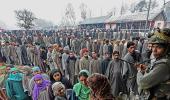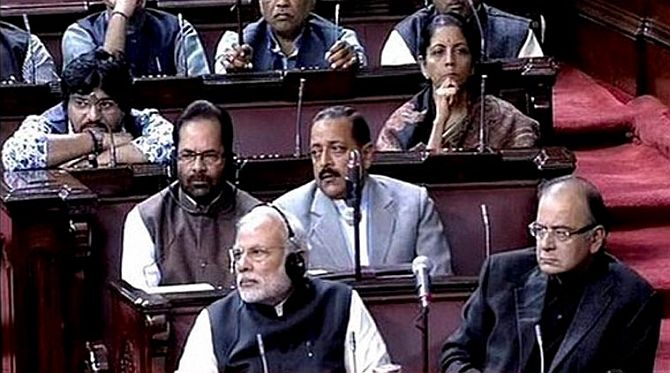
'The non-BJP parties calculate that Modi has to be countered wherever he can be before he consolidates into a political legend, maybe by winning Uttar Pradesh and even Bihar.'
'The current logjam in the Rajya Sabha is more about stalling the insurance bill than worry about conversions.'
It is not in the Lok Sabha, where the BJP has a clear majority, but the Rajya Sabha that the Opposition has ganged up to checkmate Prime Minister Narendra Modi's ambitious plans, reports Sheela Bhatt/Rediff.com
When Prime Minister Narendra Modi came to the Rajya Sabha to attend Question Hour at 12.03 pm on December 18, Rediff.com's Sheela Bhatt witnessed the proceedings from the press gallery.
An excerpt from her notes of the proceedings speaks volumes about the functioning of Indian democracy at a time when Modi is the rising sun of Indian politics.
Date: December 18, 2014.
Place: Rajya Sabha, New Delhi.
Time: 11.30 am.
Deputy Chairman of the Rajya Sabha P J Kurien was in his seat looking exasperated. To his right, the Leader of the House, Arun Jaitley, wore a light-coloured woollen shawl and a stern face.
Behind him sat first-timer Nirmala Sitharaman as if she has been in the Rajya Sabha for many decades. Her confidence in whatever she does is inescapable.
These days Mukhtar Abbas Naqvi, the minister of state for minority affairs, is vocal, more so than necessary. For the last four days, Naqvi has been on his feet in the House and screams so much that his voice has gone hoarse. He has a smirk on his face when he takes on the Congress for reasons frivolous or serious. The issue that has seized the House of Elders concerns his ministry. Today, he is wearing a suit with a woollen stole. These days most MPs wear stoles to Parliament, including Prime Minister Narendra Modi.
Since the conversion of around 57 Muslim families in poor bastis in Agra by the Bajrang Dal and the Dharma Jagran Samanvay Vibhag became public, the Rajya Sabha has not functioned. It was the fourth consecutive day when hungama was on in the Upper House.
To Kurien's left, Congress leader Anand Sharma occupied the front row. An experienced Congressman, it is not easy to judge from his speech what his real intentions are.
Normally, former prime minister Manmohan Singh, 82, attends the Rajya Sabha with punctuality and sits absolutely quiet and unmoved. He was not present early in the day. He sits in the front row and behind him sits Janardhan Dwivedi, one of the members of the Congress's core group of strategists.
Jairam Ramesh, also quite regular, observes the proceedings carefully. Don't know why he has a smug face even when his party leader speaks. Behind him sits Madhusudan Mistry who, unlike Ramesh, is loud and aggressive. He carries out the Congress high command's agenda more loyally than most.
Even though the Leader of the Opposition in the Rajya Sabha is Congressman Ghulam Nabi Azad, these days Anand Sharma leads the fight. But not debates. Azad is busy with the Kashmir election. He is soft-spoken, civil and sharp in his speeches, but is considered harmless by the Bharatiya Janata Party.
There is no debate taking place these days in the Rajya Sabha. Here, the Opposition parties rule, and the governing party, the BJP, rules in the Lok Sabha.
Democracy is all about numbers, the cynics say. Indian democracy has stretched this belief too far. In the Lok Sabha the BJP has a majority with 281 out of 542 members. The Congress has just 44 members, and the Lok Sabha is functioning well.
The majority won by the BJP shows in the huge impact in conducting the Lok Sabha where Speaker Sumitra Mahajan is proving more than firm and sticking to the rule book. As the ruling party has numbers on its side there, it is able to have its way.
But in the Rajya Sabha, out of 243 members, the BJP has just 45 while the Congress has 69. If you add to the Congress strength the Samajwadi Party (15), the Bahujan Samaj Party (10), the All India Anna Dravida Munnetra Kazhagam (11), the Trinamul Congress (12), the Janata Dal-United (12) and few others, the non-BJP parties have more than the required majority of 122.
Because the numbers are such, the institution of the Rajya Sabha has become the important battlefield in Indian politics to counter the ever-growing Modi Raj in New Delhi. Expectedly, Opposition leaders constantly allege that ministers and the prime minister are arrogant, while BJP leaders say smugly all the time inside and outside Parliament, "But we have won the people's mandate."
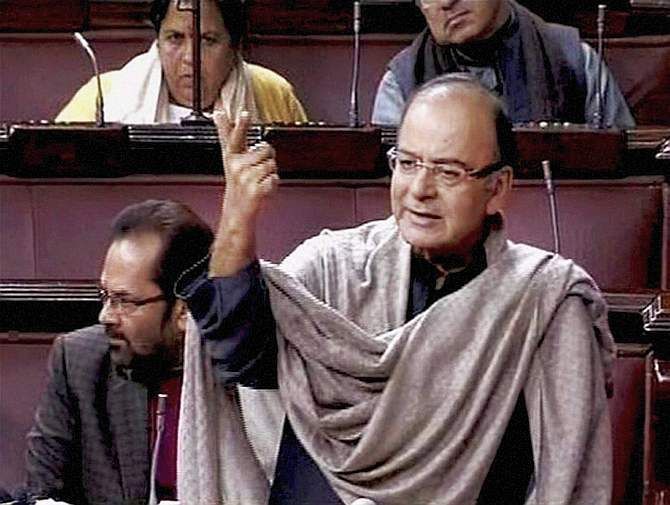
Photograph: PTI Photo.
As it was known that the prime minister would come to the House at noon/Question Hour, a kind of countdown had begun in the Rajya Sabha.
For the last two days the prime minister's absence was also 'headline news' for the news television channels. The Opposition wanted nothing less than Modi's statement on religious conversions. There was a deadlock. The waiting for the PM had begun. Meanwhile, interruptions and accusations were on. The allegation of arrogance led to interesting exchanges between Jaitley and the Communist Party of India-Marxist's Sitaram Yechury, which went like this:
Deputy Chairman Kurien: Yes, the Leader of the House. Mr Sharma, please sit down ... (Interruptions... Shri Anand Sharma, please resume your seat.
Jaitley: Sir, Shri Anand Sharma just now said that the government is being arrogant. When the session started, with regard to the statement of the minister of state (Niranjan Jyoti), the Opposition had raised an issue and demanded that the prime minister should come and give an explanation and an assurance to the House.... (Interruptions)...
The prime minister came. The prime minister made a statement which should have had a sobering effect on the members. The statement was virtually rejected. Thereafter, the demand was that the House must pass a resolution.
Finally, it settled down with the Chair (Chairman Hamid Ansari) making a statement. After a couple of days, the House started functioning.
Again, after the whole thing which has been raised now -- it may be a serious matter -- the government has made its position clear. Let me assure this House, through you, Sir, that the government has no intention o being arrogant. We want this House to function. And if the fact is that out of two Houses, one is functioning normally and the other is not being allowed to function normally, then, it is the arrogance of numbers and not the arrogance of the government.... (Interruptions)...
Yechury: Sir, I want to tell the Leader of the House... (Interruptions)... Sir, if he is accusing us saying, 'arrogance of numbers,' I would say, the other House is functioning because of the tyranny of majority.... (Interruptions... That is the term which emerged during the period of enlightenment.
(Interruptions)... And, Sir, you must put the record straight. What we were asking from the prime minister was an apology for the comments that a minister of state (Niranjan Jyoti) made.... (Interruptions)... The prime minister did not give that.
As Jaitley had said, when Niranjan Jyoti used abusive language against non-Hindus, Modi spoke in the Rajya Sabha, but it had no impact. It irked the PM no end and his colleagues were blamed for tendering wrong advice.
This time the BJP's floor managers were extra-conscious. Modi could not have avoided coming to the Rajya Sabha because during Question Hour a question was listed connected to his department. And everybody was waiting for him to arrive.
The House was adjourned at 11.46 am.
It resumed at noon.
Chairman Hamid Ansari presided over the House. The noise from the Opposition benches did not allow the proceedings, so he adjourned the House for 15 more minutes.
A minute later, Modi walked in at 12.03 pm.
Congress leader Renuka Chowdhary and others in the back rows were heard jeering the PM as he walked up to his seat. He spoke briefly to Prakash Javdekar. Modi's glamour quotient is such that he was stared at by all present in the House.
Take it or leave it, it is a fact that Modi has established himself aggressively. He is the sole pole around which leaders in both Houses will play politics in the Modi era that has just begun.
Even BJP members were looking at the PM as if they have never seen him before. So many namastes and bows of his party MPs and ministers remained unreturned by Modi as he went to the front row to occupy his seat.
The media gallery, which is normally half-empty, was full. Modi looks much slimmer than television makes him out to be.
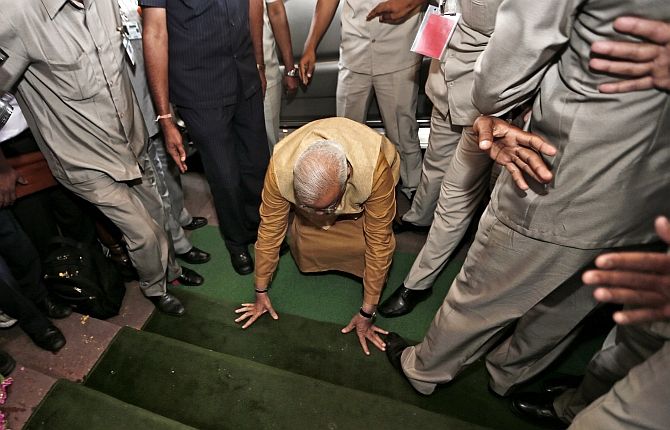
Photograph: Adnan Abidi/Reuters.
But Modi was not his natural self. No leader in his place is in a comparable situation. He was sitting in the front row which he shared with Jaitley. First, he ran his fingers through his beard and moustache. Then, he tried out many ways to sit comfortably. He seemed conscious of the attention he drew. His role today was peculiar. Without offence it can be said that it was a 'designer' performance.
His party was standing up to fight for the PM's garima because the Rajya Sabha didn't give appropriate honour to his last speech. So early in power he would not like to speak or elaborate on issues like conversion which are central to his party and the Rashtriya Swayamsevak Sangh.
The Opposition wants to force him to speak in order to trap him on issues like conversion. Everybody would like to see if he is slanting towards the Hindutva aspect of it or talks only about keeping up the Constitutional ethos of religious freedom and snubbing the plans, if any, of the RSS's affiliates.
In the situation, he was supposed to be present in the Rajya Sabha, but not supposed to speak or even express any emotion of displeasure or support to any side. He was struggling to keep a poker face, and succeeded. He remained silent. His presence did not break the logjam. But he registered his importance which was the aim.
The PM's eyes get wide and wider in certain situations. PTI photographs of those moments have captured the PM's wide eyes while attending the Rajya Sabha without participating in it. The PM was present for only 45 minutes. His senior colleagues countered the Opposition's demand to let the PM speak on the conversion issue and not make it a prestige issue.
Congress and Left leaders in the Rajya Sabha are convinced that Modi's governance style is "autocratic" where he doesn't give credence to Rajya Sabha type of "lightweight" institutions. In Gujarat, Modi's record of attending state assembly was dismal.
The urgency for non-BJP parties to scream and shout and strategise every step against the government's agenda is due to the emergence of Modi who has acquired a larger-than-life image. Their calculation goes thus: Before he consolidates into a political legend, maybe by winning Uttar Pradesh and even Bihar, he has to be countered wherever he can be.
And right now, the Rajya Sabha is the most suitable platform for it. The proceedings are shown live on television. It has a few, if not many, articulate and experienced non-BJP leaders. For the Congress and Left parties it is a now or never situation to see that the saffron party sticks to the secular ethos of the Constitution. They believe if they fail now, it will be too late to keep Modi/the BJP in check.
The Rajya Sabha is seen by them as a democratic platform available "to expose Modi's political weaknesses and doublespeak on issues of governance". They also think that Modi's "doubletalk on Hindutva and development" should be challenged now.
The news report (external link) about an RSS leader addressing Delhi University students worry the Left and Congress. They want to press on Modi to air his views of the RSS' plans in the days to come.
Like, on conversions the Rajya Sabha MPs think Modi can't openly side with the Hindutva hawks agenda but he can't totally reject re-conversions without talking about bringing in a specific legislation that would affect all religious organisations.
BJP President Amit Shah has spoken forcefully about it without rejecting the idea of .
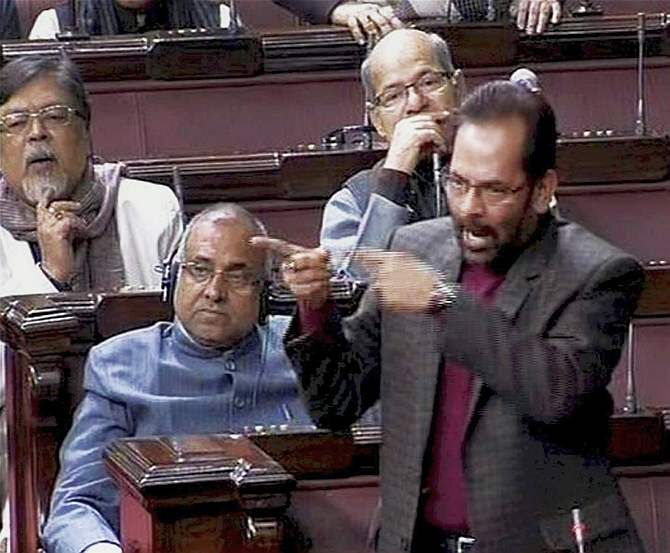
Photograph: PTI Photo.
In fact, at every step in the Rajya Sabha debate the Opposition leaders too were exposed because there was enough time given to debate the conversion bill but they simply didn't do so. They claimed that the debate would start only if Modi will listen and respond to it.
Chairman Ansari explained many times that there was no rule under which they can demand this. Jaitley said rightly, 'Now the Opposition wants to decide who will speak when and who will reply,' adding, 'I repeat the government's offer. If they want that under Rule 267, rules be suspended and subject of discussion start, let it start now.'
But nobody, really, wanted a debate. They wanted to size up Modi's ego.
To be fair to Modi and his government, it must be said that the current logjam in the Rajya Sabha is more about stalling the insurance bill than worry about conversions. Many Opposition leaders allege that Modi wants to "gift" US President Barack Obama, who will be in New Delhi for the 2015 Republic Day celebrations, the insurance bill. The politics is to stall it as much as possible.
The insurance bill will surely pass, if not in this session, then a little later. But the message from the continuous disruption in the Rajya Sabha is that even though the election of 2014 has brought Modi to the centre-stage of Indian politics and Modi has been on fast-forward mode in taking decisions, a victory of 282 seats has not culminated in absolute power, yet, for him.
Only in June-July 2016 will the BJP get a clear majority in the Rajya Sabha, that too only if it wins a substantial number of seats in the assembly elections in Bihar, UP, Assam and West Bengal. So, the Rajya Sabha has turned into a platform where the Opposition can put speed-breakers to Modi's ever-growing power.
It is better to see the Rajya Sabha deadlock from a different perspective because this is the only place where Modi is bound to hear dissenting voices.
Indian democracy is designed such that in spite of clearly losing elections and when people have given a clear mandate to Modi/BJP, there are places left where he has to sit in the front row and listen to what the CPI-M's Yechury has to say against him and his policies.
Yechury, Congress leaders and Sharad Yadav of the Janata Dal-United are effectively countering Modi's speed and spread in conducting legislative business as per his, his government, and his party's agenda.
However, countering Modi in the Rajya Sabha is not at all easy. Unless there is Opposition unity in the Upper House, the counter-attack on Modi Raj is not possible.
The BSP's Mayawati and the Samajwadi Party's Ram Gopal Yadav have, so far, contributed to Opposition unity, but in the eyes of non-BJP parties both parties remain suspect. The AIADMK and Naveen Patnaik's Biju Janata Dal are already considered to be soft on the government.
The footage of Rajya Sabha and Lok Sabha debates you see on television carries a different image, mood and perception than the actual action-interactions and plays and replays inside both Houses. It is so because the speeches, anger and delayed tactics in Parliament are 'designed' according to the political aims planned for the session.
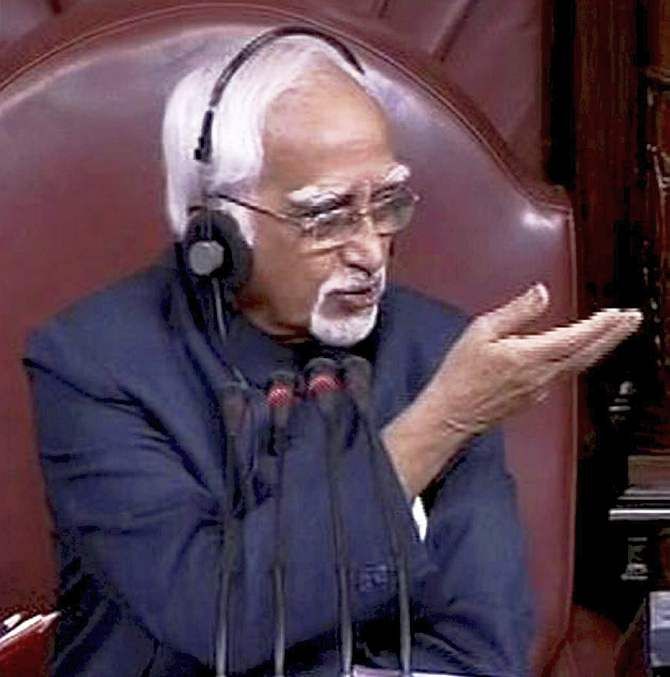
Photograph: PTI Photo.
The Congress is vague. It would not like to give Modi a huge advantage by having his way but in public the Congress says it will support the Insurance Laws (amendment) Bill. Along with it the Coal Mines (special provisions) Bill and the Goods and Services Tax Bill are other prestigious legislation which, if passed, will kick-start Modi's economic vision.
More than Modi, it is a prestige issue for the Congress and the Left to see that his plan is stalled or delayed. The Congress has legitimate woes that when the BJP was in the Opposition it stalled the same bills for political reasons.
The conversion issue, even though very important, was a God-sent excuse for the non-BJP parties. It came in handy to stall the tabling of the insurance bill.
Modi is putting his weight behind making Obama's January visit a memorable event, says an important BJP member of Parliament who met the PM recently. He claims that Modi wants to pass the insurance bill before Obama lands in New Delhi.
A joint session of Parliament can be called for passing the insurance bill, but for that the bill has to be rejected in one House and passed in another. That has not happened yet.
What is happening in the Rajya Sabha is an exercise to ensure that the government is not able to even table the bill or manages to get it 'rejected' as per the requirements of law. The bill, if passed, will help American insurance companies eye rural India's savings of millions of rupees.
According to sources, the Samajwadi Party is, in particular, facing the heat from the Central Bureau of Investigation. Similarly, AIADMK leader J Jayalalitha is on bail after her conviction in an income-tax case. The chit fund scam worries the BJD in Odisha. The BSP is facing the fall-out of the investigation into bureaucrat Yadav Singh's corruption cases.
Like it happened in the Manmohan Singh regime, these regional parties are likely to help the Modi government when they feel the political heat is not conducive to fight their case.
US Secretary of State John Kerry's presence at the Vibrant Gujarat event is a pointer of things to come in January, when Modi would like to fast-forward India-US relations.
Legislative support is necessary in Modi's scheme of things, obviously.
Eventually, the Modi government will soon have to adopt 'divide and rule' tactics to break Opposition unity in the Rajya Sabha.
.jpg)



